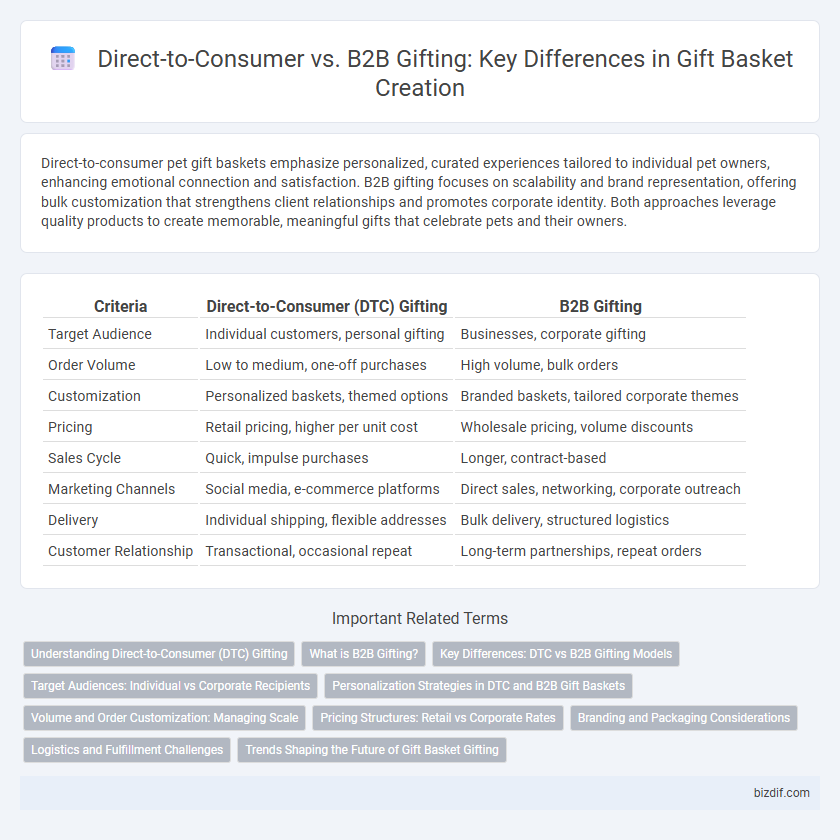Direct-to-consumer pet gift baskets emphasize personalized, curated experiences tailored to individual pet owners, enhancing emotional connection and satisfaction. B2B gifting focuses on scalability and brand representation, offering bulk customization that strengthens client relationships and promotes corporate identity. Both approaches leverage quality products to create memorable, meaningful gifts that celebrate pets and their owners.
Table of Comparison
| Criteria | Direct-to-Consumer (DTC) Gifting | B2B Gifting |
|---|---|---|
| Target Audience | Individual customers, personal gifting | Businesses, corporate gifting |
| Order Volume | Low to medium, one-off purchases | High volume, bulk orders |
| Customization | Personalized baskets, themed options | Branded baskets, tailored corporate themes |
| Pricing | Retail pricing, higher per unit cost | Wholesale pricing, volume discounts |
| Sales Cycle | Quick, impulse purchases | Longer, contract-based |
| Marketing Channels | Social media, e-commerce platforms | Direct sales, networking, corporate outreach |
| Delivery | Individual shipping, flexible addresses | Bulk delivery, structured logistics |
| Customer Relationship | Transactional, occasional repeat | Long-term partnerships, repeat orders |
Understanding Direct-to-Consumer (DTC) Gifting
Direct-to-Consumer (DTC) gifting in gift basket creation emphasizes personalized, individualized customer experiences, enabling brands to deliver tailored products directly to end-users without intermediaries. This approach leverages data analytics and customer insights to customize selections, packaging, and messaging, enhancing consumer satisfaction and brand loyalty. DTC gifting streamlines logistics, reduces costs, and allows for real-time feedback, distinguishing it from traditional B2B bulk or corporate gifting models.
What is B2B Gifting?
B2B gifting involves businesses sending curated gift baskets to clients, employees, or partners as a strategic gesture to strengthen professional relationships and enhance brand loyalty. These gift baskets often include customized items such as branded merchandise, gourmet snacks, and luxury products tailored to the recipient's preferences and corporate culture. Unlike direct-to-consumer gifting, B2B gift baskets emphasize long-term business value and personalized corporate messaging.
Key Differences: DTC vs B2B Gifting Models
Direct-to-consumer (DTC) gifting focuses on personalized gift baskets tailored to individual preferences, enhancing customer experience through customization and direct engagement. Business-to-business (B2B) gifting emphasizes bulk orders, brand alignment, and corporate relationships, catering to employee recognition and client appreciation with scalable solutions. DTC models prioritize emotional connection and unique presentation, while B2B models optimize for efficiency, volume discounts, and consistent branding.
Target Audiences: Individual vs Corporate Recipients
Direct-to-consumer gift baskets primarily target individual recipients seeking personalized and unique gift options for occasions such as birthdays, holidays, or anniversaries. In contrast, B2B gifting focuses on corporate recipients, aiming to strengthen client relationships, reward employees, and enhance brand loyalty through customized, professional gift baskets. Understanding the distinct preferences and expectations of individual versus corporate audiences is crucial for creating effective and appealing gift basket offerings.
Personalization Strategies in DTC and B2B Gift Baskets
Personalization strategies in direct-to-consumer (DTC) gift baskets focus on tailored product selection based on individual preferences, leveraging customer data to enhance emotional connection and satisfaction. Business-to-business (B2B) gifting emphasizes branded items and bulk customization, incorporating corporate logos and personalized messages to strengthen client relationships and brand awareness. Utilizing advanced customer insights and scalable customization tools ensures both DTC and B2B gift baskets effectively meet distinct personalization needs.
Volume and Order Customization: Managing Scale
Direct-to-consumer gift basket orders typically involve lower volumes with high customization options tailored to individual preferences, enabling personalized experiences. B2B gifting demands managing larger order volumes, often with standardized customization to ensure consistency and efficiency across corporate clients. Efficient scale management in B2B requires streamlined production workflows and bulk packaging solutions to accommodate high-volume orders without sacrificing quality.
Pricing Structures: Retail vs Corporate Rates
Retail gift baskets in direct-to-consumer sales typically feature fixed pricing with standard markups to cover packaging, customization, and shipping costs, appealing to individual buyers seeking unique, personalized gifts. Corporate rates in B2B gifting often offer tiered or volume-based discounts, reflecting bulk order benefits and long-term partnerships, which reduce per-unit costs and cater to budget-conscious companies. Pricing structures balance cost efficiency with customization, ensuring competitive offers for personalized retail customers and scalable savings for corporate clients.
Branding and Packaging Considerations
Direct-to-consumer gift baskets require personalized branding and packaging that enhances the unboxing experience, emphasizing the recipient's emotional connection to the product. B2B gifting prioritizes professional, scalable packaging that reflects corporate identity and maintains product integrity during bulk shipping. Effective design choices in both models amplify brand recognition and customer loyalty while aligning with target audience expectations.
Logistics and Fulfillment Challenges
Direct-to-consumer gifting demands personalized packaging and timely delivery to individual addresses, often requiring advanced tracking systems to manage high volume, diverse orders efficiently. In contrast, B2B gifting involves bulk shipments to corporate locations, necessitating coordinated scheduling, inventory management, and compliance with procurement policies. Both models face logistical hurdles, but DTC prioritizes speed and customization, while B2B emphasizes scalability and integration with corporate supply chains.
Trends Shaping the Future of Gift Basket Gifting
Direct-to-consumer gift basket trends emphasize personalization and experiential packaging, leveraging e-commerce platforms to reach individual buyers seeking unique, customizable options. B2B gifting increasingly incorporates branded, sustainable baskets designed to strengthen client relationships and showcase corporate values, driven by demand for eco-friendly materials and targeted marketing strategies. Emerging technologies like AI-powered customization and data analytics are transforming both D2C and B2B gift basket markets by optimizing product offerings and enhancing customer engagement.
Direct-to-consumer vs B2B gifting Infographic

 bizdif.com
bizdif.com